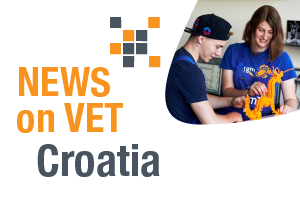Croatia's vocational education and training (VET) system is undergoing a curricular reform. Focusing on skills development, work-based learning, and a learner-centred approach, the new VET curricula aim to revolutionise teaching and learning. Discover the key highlights from the recent VET Teacher Days and the anticipated impact of this reform on the future of VET in Croatia.
The VET Teacher Days, organised by the Agency for VET and Adult Education (ASOO) in Croatia between 21 and 23 March 2023, offered 430 VET teachers and 180 VET provider directors insights into the forthcoming reform rollout. Croatia's new VET curricula aim to revolutionise the teaching and learning landscape by prioritising skill development and work-based learning (WBL) and adopting a learner-centred approach. The modular structure of the curricula promotes problem-based teaching and learning, integrating theory and practice, while the introduction of CSVET points (credit system for vocational education and training) in VET is set to enhance learner accountability and overall progress. In modular curricula, CSVET points are linked to learning assessment: based on the assessment criteria, learners are awarded CSVET points that correspond to the level of learning outcomes demonstrated.
During the VET Teacher Days, VET providers welcomed the numerous benefits associated with the proposed VET curriculum reform. The long-awaited updates to the curricular content, tailored to meet the dynamic demands of the labour market, along with the ongoing enrolment of the new occupational and qualification standards in the Croatian qualifications framework register, were particularly well-received. The modular structure of the curricula was seen as an opportunity to improve the learning outcomes approach and increase the overall attractiveness of VET. In addition, the VET provider curriculum received praise for its adaptable structure, which allows for customisation through the inclusion of optional modules. This approach is expected to improve collaboration among teachers in planning and delivering joint modules, while also promoting cooperation among VET providers.
Conference sessions focused on the integration of general education content within VET modules and the harmonisation of vocational and general education components within the modular structure of the curricula. It was emphasised that closer cooperation between teachers responsible for general and vocational education components of the curriculum is crucial in effectively delivering joint modules and facilitating efficient learning assessment. However, concerns were raised regarding the permeability of VET graduates and their prospects of enrolling in university education. VET graduates account for a significant portion (45%) of higher education enrolment immediately after graduation. Admission to higher education is primarily determined through the assessment of general education subjects via the State matura exam. Some conference participants feared that the integration of general education subjects in vocational modules would minimise the importance and scope of general education content and, therefore, affect the level of general competences needed for enrolment in higher education. In addition, practical matters such as changes in class organisation, teacher contracts and salaries, and teaching schedules were also among the topics of interest for VET providers.
Led by ASOO, the curriculum development in Croatia is now entering its final stage in 2023. This comprehensive reform introduces over 200 occupational standards, 145 qualification standards, and 140 new curricula in VET. The process of updating the curricula began in 2018 with the adoption of the National Curriculum for VET, marking the first major update to VET curricula in over 20 years. Key steps for the introduction of new curricula to VET providers involve public consultation, approval by the ministry responsible for education, and finally, adoption by the Parliament. The timeframe for the implementation of the new curricula in VET schools is currently being agreed with the relevant ministry. Starting in 2024, ASOO has announced plans to intensify teacher training by conducting visits to all 300 VET providers across Croatia, in order to improve teacher competences for planning and implementing teaching and learning activities within the modular framework of the curricula.
Read more
|
Please cite this news item as: ReferNet Croatia; Cedefop (2023). Croatia: VET curriculum reform nears final stage. National news on VET |
